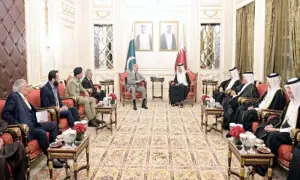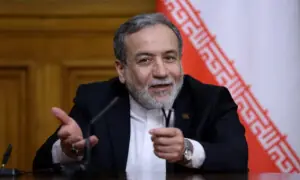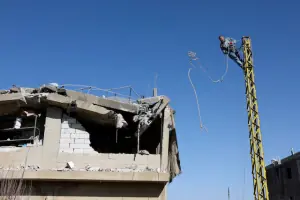Spain to recognise Palestinian state with East Jerusalem as capital
7 min readSpain will formally recognise Palestine as a state with East Jerusalem as its capital at the Meeting of the Councils meeting on Tuesday, the prime minister said.
“I would like to inform you that at the meeting of the councils that will be held today, the Government of Spain will approve the official recognition of Palestine as a state,” Spanish Prime Minister Pedro Sánchez said as he stood outside his office in Madrid on Tuesday.
The other two European states, Ireland and Norway would also make the announcements later in the day. It was slammed by Israel as a “reward” for Hamas more than seven months into the devastating Gaza war.
With such a decision Spain, he said that the European country joins more than 140 countries that already recognise Palestine.
Sanchez described it as a “historic” that has a single goal to contribute to achieving peace between Israel and Palestine.
“The recognition of the state of Palestine is not only a matter of historical justice, with the legitimate aspirations of the Palestine people but it is also an imperative need to achieve peace,” he said and added that it was the “only way” to realise the solution states can recognise as the only possible one to achieve the future of peace that offers Palestine state that co-exist alongside the state of Israel in peace and security.
“The state of Palestine must be viable with the West Bank and Gaza connected by a corridor and with East Jerusalem as its capital and must be unified under the legitimate government of Palestine National Authority.”
Although it is not up to Spain to define the border of other countries, he said that the country’s position was aligned with the UN Security Council Resolutions 242 and 348 and with the position of the European Union. “Therefore, we won’t recognise any changes in the 1967 [border] lines other than those agreed by the two parties. It is also essential that Palestine finds its adequate place in the international community that is why Spain will continue to support efforts to strengthen Palestine’s presence in international organisations.”
Sanchez clarified that the recognition of Palestine was not against anyone, least of all Israel.
Furthermore, he said the decision reflected Spain’s absolute rejection of Hamas, a terrorist organisation, who is against the two-state solution. “From the outset, Spain has strongly condemned the terrorist attacks of October 7. This clear combination is the resounding expression of our steadfast commitment to the fight against terrorism.”
From Wednesday, the Spanish PM said that the country would focus all of its efforts to implement the two-state solution and making it a reality. He underlined three main priorities.
Firstly, the countries must urgently put an end to the ongoing unprecedented crisis in Gaza. He reiterated his call for permanent ceasefire and for the entry of humanitarian aid and for the immediate release of all the Israeli hostages held by Hamas.
“Secondly, we will support the Palestine national authority in the reform process initiated by its new government. The Palestine authorities have partnered for peace and it will need all of our support and finally we will continue to foster cooperation with our Arab partners who are working and committed towards peace and prosperity in the region. We will continue working with them, with the aim of convening a national peace conference to implement the two-state solution.”
He further clarified that the decision that Spain was solemnly adopting was based on the respect for international law and the defence of the rules based international order.
“These are the principles that guide us always no matter the context, both in Gaza, Palestine and in Ukraine. Spain will always defend the proposes and principles established in the Charter of UN.
With today’s decision, we assume our responsibility in the search for peace, security, and prosperity of all peoples in accordance with the mandate with the preamble of our national constitution. But above all, we act in accordance to what is expected of a great country such as Spain.“
Symbolic impact
The three European countries believe their initiative has strong symbolic impact, which will likely encourage others to follow suit.
They also point to Norway and Spain’s historic role in advancing Israel-Palestinian peace efforts: in 1991, the two sides sat down together for the first time at a Madrid peace conference that paved the way for the 1993 Oslo Accords.
“Recognising the state of Palestine is about justice for the Palestinian people,” Spanish Foreign Minister Jose Manuel Albares said on Monday in Brussels.
It was also “the best guarantee of security for Israel and absolutely essential for reaching peace in the region”, he said alongside his Irish and Norwegian counterparts.
The plans were unveiled last week in a coordinated announcement by their prime ministers, with formal recognition to take place in all three countries on Tuesday.
Spanish Prime Minister Pedro Sanchez will give an address at 0630 GMT before his cabinet meets to adopt a decree recognising Palestinian statehood. The Irish government will also meet during the morning.
Differences within the EU
Norway informed Palestinian prime minister Mohammed Mustafa at the weekend that its recognition would also take effect on Tuesday.
Although Slovenia has also started the process of recognising a Palestinian state, the issue has provoked sharp disagreement within the 27-nation European Union. Spain and Ireland are part of the bloc.
For decades, formal recognition of a Palestinian state has been seen as the endgame of a negotiated peace between Israelis and Palestinians.
Washington and most Western European nations have said they are willing to one day recognise Palestinian statehood, but not before agreement on thorny issues like the status of Jerusalem and final borders.
The spiralling bloodshed in Gaza has revived calls for Palestinians to be given their own state, with a growing number of European countries expressing a desire to do so.
Within the EU, states like France believe it is not the right time to do so, while Germany only envisages recognition following negotiations between the two sides.
Tuesday’s move by Spain, Ireland and Norway will mean 145 of the UN’s 193 member states now recognise Palestinian statehood.
These include many Middle Eastern, African and Asian countries, but not the United States, Canada, most of western Europe, Australia, Japan or South Korea.
In 2014, Sweden became the first EU member to recognise a Palestinian state, following six other European countries that took the step before joining the bloc: Bulgaria, Cyprus, the Czech Republic, Hungary, Poland and Romania.
‘Award for Hamas’ -
Last week’s decision by Madrid, Dublin and Oslo has provoked a furious response from Israel.
On Monday, Israeli Foreign Minister Israel Katz said he had told Spain’s consulate in Jerusalem to stop offering consular services to West Bank Palestinians from June 1 as a “preliminary punitive” measure.
“We will not put up with harming Israel’s sovereignty and security,” he said, describing recognition of Palestinian statehood as giving “an award to Hamas”, whose unprecedented October 7 attacks sparked the Gaza war.
Hamas militants stormed into southern Israel on that day in an assault that resulted in the deaths of more than 1,170 people, mostly civilians, according to an AFP tally based on Israeli official figures.
Militants also took 252 hostages, 121 of whom remain in Gaza – among them 37 the army says are dead.
Israel’s retaliatory offensive has killed more than 36,000 people in Gaza, also mostly civilians, according to the Hamas-run territory’s health ministry.
Katz posted a contentious video on X, formerly Twitter, on Sunday that spliced footage of the October 7 attacks with flamenco music and dance alongside the words: “Spanish Prime Minister Sanchez: Hamas thanks you for your service”.
Spain’s top diplomat denounced the video as “scandalous and revolting”.
Also, read this
Israeli attack on Rafah tent camp kills 45, prompts international outcry
PM Shehbaz pins high hopes for Palestine after three European countries decision
On Saturday, Spain’s Defence Minister Margarita Robles accused Israel of committing “a real genocide” in Gaza.
Until now, such language had only been heard from far-left ministers of the coalition government but not from the Socialist party.
“Some have framed our decision to recognise the state of Palestine as… a reward for terror. Nothing could be further from the truth,” Irish Foreign Minister Micheal Martin said Monday.
With the move, Dublin, Madrid and Oslo want “to see a future of normalised relations between the two peoples” and to implement a two-state solution, he said.
For the latest news, follow us on Twitter @Aaj_Urdu. We are also on Facebook, Instagram and YouTube.




























Comments are closed on this story.